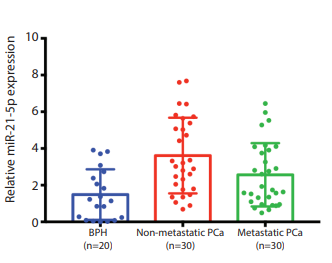Objective: To evaluate the miR-21-5p and miR-200c-3p expressions in the urine of patients with prostate cancer (PCa) and to investigate their potential as biomarkers.
Material and methods: The urine samples collected from 80 patients, including 20 patients diagnosed with benign prostate hyperplasia (BPH) and 60 patients diagnosed with PCa, were examined. The exosome isolation was performed using the miRCURY exosome isolation kit (Exiqon, Denmark), total RNA was extracted using the miRCURY RNA Isolation Kit-Biofluid kit (Exiqon, Denmark), and complementary DNA (cDNA) was synthesized using the Universal cDNA Synthesis kit (Exiqon, Denmark). A quantitative polymerase chain reaction (qPCR) analysis of gene expression was performed using the qPCR CFX 96 Thermocycler (Bio-Rad). All the procedures followed the manufacturer’s recommendations.
Results: The overexpressions of miR-21 in the non-metastatic PCa and metastatic PCa group compared to the BPH group were statistically significant with a p-value of 0.001 and 0.018, respectively. The non-metastatic PCa compared to the metastatic PCa group was also statistically significant with a p-value of 0.037. The under expressions of miR-200c in the non-metastatic PCa and metastatic PCa group compared to the BPH group are statistically significant with a p-value of 0.001 and 0.001, respectively.
Conclusion: The overexpressions of miR-21 found in this study could be a potential non-invasive diagnostic tool for patients with PCa. Despite the significant results in our study, the use of micro-RNA in urine samples may vary due to epigenetic variation. Further studies with larger populations are required to investigate the role of miR-21 and miR-200c as biomarkers in PCa.
Cite this article as: Danarto R, Astuti I, Umbas R, Haryana SM. Urine miR-21-5p and miR-200c-3p as potential non-invasive biomarkers in patients with prostate cancer. Turk J Urol 2020; 46(1): 26-30.

.png)
.jpg)
.png)
.png)
